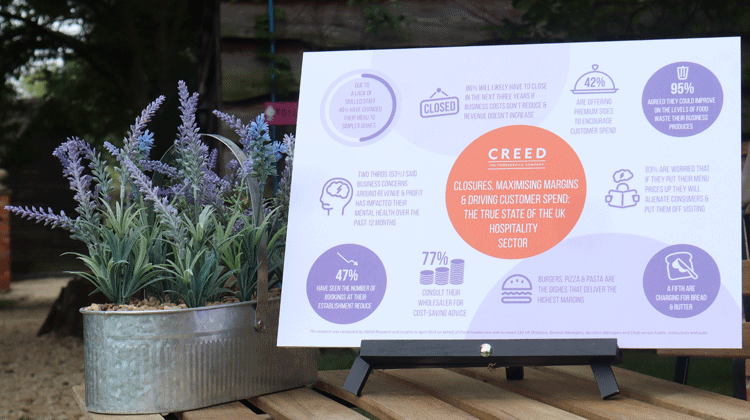Promotion
How to maximise margins and drive customer spend

With a staggering 86% of UK hospitality operators saying they will likely have to close in the next three years if their business costs don’t reduce and their revenue doesn’t increase, one of the UK’s largest nationwide wholesalers hosted a roundtable last week to discuss ways the sector can navigate the current challenges.
Creed Foodservice commissioned The Plates to Profits Report where it surveyed directors, owners, managers and chefs in restaurants, hotels and pubs across the country, to bring to life the impact the pandemic, rising inflation and increasing food costs, together with the squeezed consumer purse, is having on their operations.
On 12 July, the wholesaler welcomed leading professionals from the hospitality sector for an intimate roundtable event in The Lodge; its outdoor venue surrounded by open fields, based not far from the company’s Staverton depot. It’s here, where there is also a barn, which boasts a large wood-fired pizza oven, fire pits to BBQ meats in the fresh air and chilling areas to house produce, where Creed often welcome customers to showcase their food, solutions and outdoor cooking methods.
Chaired by Philip de Ternant, managing director at Creed Foodservice, the roundtable attendees included:
- Sue Williams, general manager at Whatley Manor, a five-star hotel and Michelin star restaurant, and a representative for charity Hospitality Action
- Louise Burnell, senior food and beverage manager at The Cheltenham Trust, an independent charity which manages historic and iconic venues in Cheltenham, including the Pittville Pump Room and Heritage Café Orangery, The Wilson Art Gallery and Museum and the Town Hall
- Alex Breach, executive chef at The Dial House Hotel and Restaurant, situated in Bourton-on-the-Water in the heart of the Cotswolds
- Anna Clapson, insights manager at Creed Foodservice
- Rob Owen, executive business development chef, at Creed Foodservice
The conversation was focused around four key talking points: Changing consumer behaviour; Menu engineering; Food waste; and Initiatives to drive consumer spend.
Changing consumer behaviour
With consumers’ finances increasingly being squeezed, the group discussed changes they’re seeing in their customer’s behaviour, recent insights and results from the report.
Data from Lumina Intelligence reveals that 77% of consumers are value-led; a trend which is growing year-on-year. This is not overly surprising given how consumers are carefully considering how they spend their, often limited, disposable income. Creed’s report shone a light on how this is impacting operators - nearly half (47%) said they have seen the number of bookings reduce, four out of ten (40%) said customers are choosing more affordable dishes and reducing the number of sides they order and three out of ten (29%) said customers are not ordering coffee or tea at the end of their meal.
Low-ticket items such as coffee and cake and also afternoon teas, which offer customers a perceived sense of value for money, are proving popular and remain in high demand.
Menu engineering
How do operators still offer high-quality dishes when they are facing staff shortages and a lack of skilled people within the team? According to data from the Office of National Statistics, the number of job vacancies in the hospitality sector hit 146,000 between November 2022 and January 2023.
Creed’s report revealed that due to not having a highly skilled chef or catering team, 47% of operators have had to change their menus to offer simpler dishes and 39% have reduced their opening days and times.
Not serving food on some days, or reducing opening hours, leads to missed revenue opportunities; not something operators can afford to do in the current climate. Serving quality food doesn’t have to be sacrificed due to a lack of staff; there are a lot of high-quality dishes that can still be served without the input of a highly skilled chef team - it’s a case of knowing what products are out there that can help operators do this. The range of pre-made sauces, stocks and gravies, frozen desserts and part-bake dishes available on the market is wide ranging and quite incredible.
Staff shortages have been accelerated post-Covid, where being forced to remain home led some hospitality professionals to seek an alternative work/life balance. One attendee shared that a recent chef de partie job role at a neighbouring venue was advertised that attracted three applicants; two were asking for incredibly high wages and the other wasn’t the right fit. The job was then marketed as a four-day a week role and 75 applications were received.
Food waste
Food waste remains an issue that needs improvement - a whopping 95% of operators told Creed in its report that they could improve on the levels of food waste their business produces.
Understanding where food waste is coming from is key and looking at what is coming back on the plates is really informative. Are portion sizes too big, or are there accompaniments that aren’t getting eaten every time that can be removed?
Equally, having conversations with the chefs, who don’t personally pay the bills, to ensure they understand the cost of the food coming in through the back door is important. It will help galvanise them into reviewing order quantities and aligning budgets better. Stock rotation is also key and ensuring all kitchen staff are trained in managing this will make a difference to waste levels.
Utilising typical food waste in dishes often comes down to a mindset change more than anything else. If there are wilting herbs - make a pesto, if there are vegetables in the fridge that are about to go off - peel them and make them into a crispy bar snack or a crunchy topping that could be sprinkled onto a main dish.
Initiatives to drive consumer spend
What is encouraging, is that the fighting spirit is clearly alive within the sector. There are lots of initiatives being deployed that help drive business through the door and encourage customers to spend when they visit.
For operators looking to attract corporate clientele, having strong environmental credentials can make a significant impact on bookings. Businesses are increasingly under pressure to only book stays with hotels that meet certain sustainable criteria. Once an operator meets these standards, and is awarded a certification, corporate bookings will naturally increase, helping drive additional revenue in leaner times.
Asking for deposits at the point of booking is also increasingly common-place to help reduce no-shows; particularly in areas where tourism levels are high and therefore consumers may not feel a loyal affinity to an establishment. Losing 10 covers on a busy evening, each worth £50, adds up.
Consumers are increasingly seeking experiences when they eat out, reflected in the number of themed bars and restaurants opening up. A sense of theatre can be created through sharing platters and plates that look visually impactful and can be easily themed to suit different occasions. Platters can easily combine lower cost items with more luxurious bits to keep costs down.
Even taking simple lunch dishes and giving them a twist can not only save money on the ingredients but also command a higher price point. A great example is switching regular sandwiches for open sandwiches which can be topped with an array of colourful salads and protein options, drizzled in sauces or dressings and reduce the amount of bread, filling and garnishes needed.
Working together, sharing ideas and supporting each other through these difficult times will make a real difference, and help many emerge out on the other side. Everyone in the supply chain is impacted; no one is immune. The importance of finding solutions and moving forwards together is essential in navigating these difficult times.
For more information about Creed Foodservice visit the website here.

































